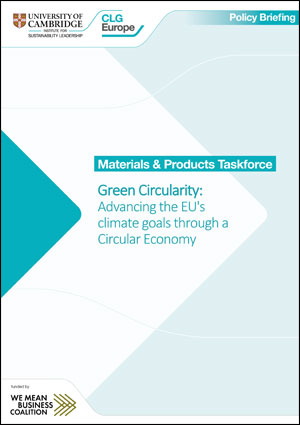10 November 2022 - The new Materials and Products policy briefing identifies opportunities and challenges that policymakers can address to ensure that businesses are able to accelerate the transition to a climate neutral and circular economy.
Download the policy briefing here.
Visit the Material and Products Knowledge Hub to read more thought leadership on circular economy.
About the policy briefing
The Materials and Products Taskforce carried out an in-depth analysis of the current EU Circular Economy Action Plan and warmly welcomed the progress being made. For maximum impact, however, there is also a need to address wider issues, and to help resolve a series of challenges that businesses encounter when driving to become more circular and sustainable.
The purpose of this briefing is to provide a progressive business perspective on what policymakers can do to ensure a successful transition to a climate neutral and circular European economy.
Key Takeaways
Building a circular economy must be given the necessary attention and support it requires, so that economic activity and environmental and societal wellbeing can be successfully integrated. The analysis makes the following key recommendations for a successful circular economy transition:
- Clarification on the meanings and metrics surrounding the circular economy concept are required if businesses are to see clear transition pathways to improve their circularity. Conceptual contention ultimately risks the circular economy concept being undermined.
- Use of demand-side policy to create the necessary long-term demand for sustainable materials and products and services that is needed to boost business confidence.
- Policymakers should build a greater link between stakeholder consultations and legislative outputs as they continue to develop and deliver the CEAP. Because of the gaps in research on circularity and varying business models, it is key that policymakers are constantly refreshing their understanding of latest technology and practices. This is an opportunity to strive for more tailor-made and effective policy.
- Greater integration of financial and investment policy decisions with the promotion of circularity. This can be achieved by increasing understanding of the importance of circular practices within the finance community, whilst also ensuring that there is a strong understanding across different policymaking institutions of the benefits that fiscal measures can play in increasing circular practices.
Read the briefing for further details on key findings.
Quotes from businesses
Martin Porter, Executive Chair, CISL Brussels, said:
“There is now abundant evidence of the importance and urgency of building a much more fundamentally circular European economy - essential for the EU to follow a 1.5 degree pathway for sustainability as well as building resilience, security and competitiveness for materials industries and their value chains. This report builds on this to show how leading businesses are seeking to drive that agenda in practice and the key policy changes that would enable the ambition to be realised, with immediate benefits and impact. With COP27 demanding much more is done by all involved in tackling the climate emergency, it is crucial that this opportunity is seized now and we turbo-charge activity by private and public sectors alike by acting on these recommendations.”
Hilde Merete Aasheim, CEO, Norsk Hydro, said:
“Increased recycling and holistic circular-economy practices are key to achieving climate neutrality by 2050, increasing resource efficiency and strategic autonomy. Aluminium is infinitely recyclable and an ideal metal for both the circular and low-carbon economy. However, to date the collection rates of secondary raw materials are too low.
To “close the loop”, the Circular Economy Package should increase collection of used materials for recycling and make available reliable and transparent information on sustainability along the value chain. This will enable consumers to choose the most sustainable and resource efficient products with the lowest carbon footprint.”
Anthony Abbotts, Group Public Affairs and Sustainability Director at ROCKWOOL Group, said:
“The European Commission’s Circular Economy Package is a solid start, though geopolitical realities coupled with the enduring climate crisis require much bolder policy. To achieve a conducive regulatory environment for circular products we need to promote durable, healthy and recyclable products and at the same time proportionally disincentivise non-circular products. We should also avoid sub-optimisation by for example encouraging higher levels of recycled content at the expense of durability and recyclability. In this way we can prevent the Renovation Wave from turning into a waste wave.”
Harry Verhaar, Head of Global Public & Government Affairs, Signify, said:
“As we are entering another round of climate negotiations at COP27 focusing on implementation, it is vital to demonstrate that the transition to a circular economy is essential to tackle the climate crisis. Leading businesses are already demonstrating how circularity solutions can drive climate action. However, stronger policy coherence is needed to fully harness the opportunity circular economy presents to address climate change. These include policies to make products more efficient, as well as greater circularity considerations in procurement.”
Sophie Punte, Managing Director, Policy, We Mean Business Coalition, said:
“We cannot meet our climate goals with the energy transition alone. With 70% of emissions stemming from materials handling and use, the transition to a circular economy – where no materials are wasted – is a critical to a net zero future. This requires a mind shift of consumers and manufacturers, financing models that favour circularity, and government policies and regulations. A Circular Economy Package can be pro-climate and circular by focusing on materials circularity and product repair by industry, greater corporate disclosure, and fiscal reform that taxes pollution rather than labour.”
Background
The Materials and Products Taskforce was launched with the aim of driving forward policy action on sustainable materials by bringing together a group of progressive businesses across sectors and value chains. The group brings together companies that are actively committed to producing and using climate neutral and sustainable materials, and who want to work together to promote and support EU-wide measures to decarbonise material production and use.






